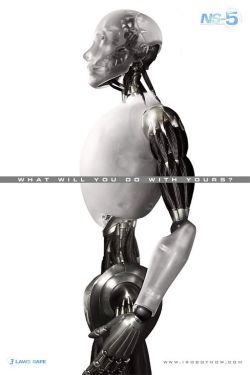I, Robot Movie Review

I, Robot
Director Alex Proyas
Starring Will Smith, Bridget Moynahan, and Alan Tudyk
Writers Akiva Goldsberg and Jeff Vintar

I find it a little hard to describe why I like I, Robot so much. I feel drawn to the movie again and again. In a certain fashion, this is typical of the work of Alex Proyas, the director of I, Robot. Alex Proyas is probably best known for directing The Crow, with Brandon Lee, the ill-fated son of Bruce Lee. The Crow is a cult classic, loved by goths the world over, and its cachet is only increased by the untimely death of Brandon Lee during filming of the movie. Proyas also directed Dark City, a lesser cult film, but a cult film nonetheless, and also one of my favorites. Proyas apparently has a knack for this kind of thing.
I like I, Robot, even though in a certain sense I find its premise intrinsically implausible. That is because I am generally a fan of theLucas-Penrose argument for the impossibility of creating an artificial intelligence by means of a computer algorithm (meaning a Turing machine more generally). Refutations of this argument often verge on the comical, because they are often forced to end up insisting that humans cannot reason, either. Part of the problem here is that Lucas is a philosopher, and many (most?) scientists and mathematicians haven't got any clue what he means by "reasoning". Reasoning, as he means it, simply cannot be an entirely physical phenomenon, as argued by Aristotle in De Anima. I am on record in public (admittedly a small public) as predicting that A.I. in the strong sense is impossible for precisely this reason.
Nonetheless, I have no issue with the kind of robots portrayed in I, Robot, because if machine intelligence is possible, it will be something like what you see in this movie. If you create a machine that can reason, then by necessity it will be able to choose good or evil of its own free will. You just might not like the result.
One of the few parts of I, Robot that actually conforms to Asimov's collection of short stories is the Three Laws of Robotics. Asimov created the Three Laws to break the mold of Mary Shelley's Frankenstein on artificial life stories, but Proyas' version of I, Robot restores this fear to the plot.
This fear is driven by the truth that logic, like justice, is cruel. None of us really look good in the harsh light of justice; no one can live up to their own principles. Logic is not much better; few of us can follow our principles to their logical conclusions. As Dr. Alfred Lanning says in response to question, "Is there a problem with the Three Laws?", "The Three Laws are perfect." There is only one logical conclusion, and robots, by definition, are logical. Even classical philosophies such as Stoicism would be unable to embrace that blunt conclusion.
Asimov actually toyed with this idea himself, as the Zeroth Law of Robotics: A robot may not injure humanity, or, through inaction, allow humanity to come to harm. This is the same logical deduction made by VIKI, the malevolent mainframe. Thus, it is not surprising that we fear logic, because logic inexorably leads to our collective perdition. The deeper reason for this is that logic itself is incomplete, especially when expressed in natural language. Any mathematics complex enough to include arithmetic must include an unprovable statement, in the sense that it cannot be deduced from within the system itself. Steve Sailer once noted that contracts are written in something like COBOL. The intent of this is to reduce uncertainty about what the contract actually means. Legalese accomplishes this goal fairly well, but you cannot reduce the uncertainty to zero, because words do not possess absolute definitions, a point made by Fr. Stanley Jaki OSB. Any time spent with a lawyer will prove this assertion to your satisfaction.
This unsuspected philosophical subtlety surprised and pleased me. Even more so because I, Robot seems like an action movie, and a fine one it is. Shooting killer robots, like shooting zombies, never really gets old.


Comments ()